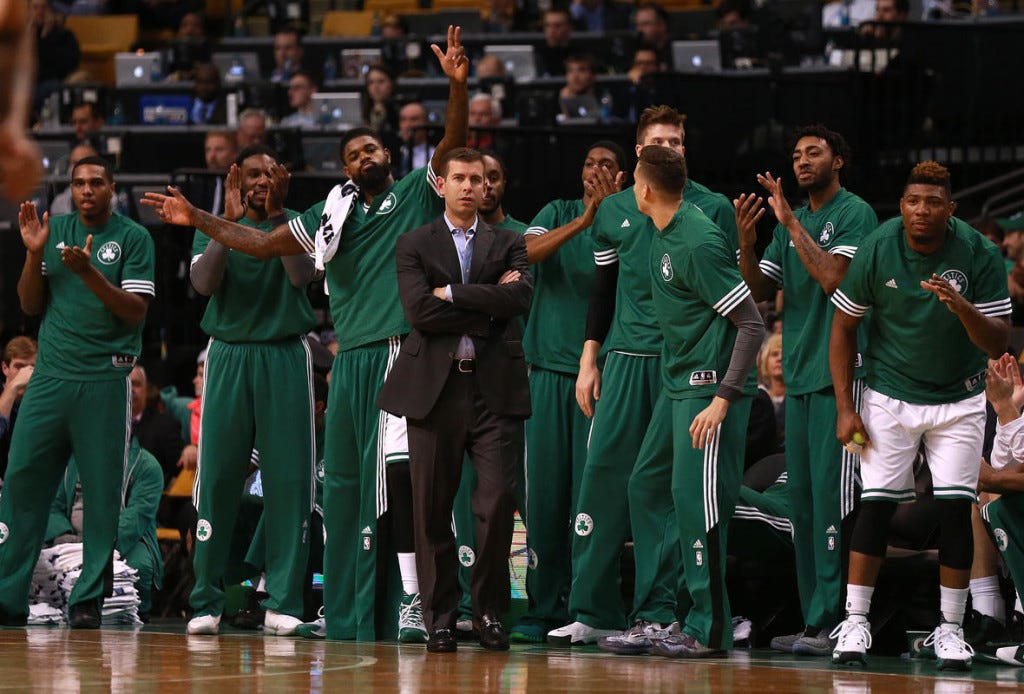ESPN Projects The Celtics To Finish Second In The Eastern Conference
To steal a line from the boys over at Pardon My Take…uhhhhhhh ya think?
You may or may not have seen this, but ESPN came out with their win total projections for all 30 NBA teams using some fancy math algorithm or something called RPM. If we’re being completely honest, unless I can cheat and store this math stuff into my TI-86 to pull up to use during a test, it all kinda goes over my head. Basically, this is what it is and how it was explained when ESPN first introduced it
RPM was developed by Jeremias Engelmann and Steve Ilardi to estimate a player’s on-court impact on team performance, measured in net point differential per 100 offensive and defensive possessions. RPM takes into account teammates, opponents and additional factors. When used along with playing time projections, it’s proved to be a very accurate predictive tool overall. As the name suggests, real plus-minus shares a family resemblance with the +/- stat in the box score, which merely registers the net change in score (plus or minus) while each player is on the court. RPM is inspired by the same underlying +/- logic: If a team outscores its opponents when a player is on the court, he’s probably doing something to help his team, whether or not he’s putting up big numbers. But the familiar +/- stat has a serious flaw: Each player’s rating is heavily influenced by the play of his on-court teammates. For example, in the basic +/- numbers, Thunder backup point guard Reggie Jackson is ranked 27th in the league. But he’s also spent the majority of his minutes playing alongside Kevin Durant, the league’s likely MVP. What we really want to know is how much of Jackson’s elite rating is attributable to his own play, and basic +/- simply can’t tell us. But real plus-minus can.
This is about as scientific and foolproof as you’re going to get when it comes to projections. If you remember, their RPM projected the Celts to win 48 games last year, and they hit the nail on the head. This year, they have the Celtics winning 49.8 and finishing second in the conference (they have TOR regressing). This may be a surprise to some who come across this projection, but its obviously old news around these parts. I spent the morning looking around other site’s projections for the Celts, and they are all saying the same thing. Top 2 team. On the surface I love it, the team is finally getting some fucking respect after last year’s debacle when almost every major NBA writer was talking about 38 wins, or low 40 wins and a 7 seed. But part of me is a little unsettled. Part of me feels super hipster about this whole thing, like we’ve always known the Celtics were good. Now that they backed up that claim, everyone else wants to jump on board. That’s fine, happy to have them, but here’s the other side of the coin that makes me a little nervous.
I don’t think it would have been outrageous to say some of the Celtics success last year was because honestly teams probably slept on them. A team that made the playoffs 2 games under .500 and got completely manhandled by CLE, they certainly weren’t given lofty expectations heading into last season. I think that disrespect motivates this group because it fits the personality of the team. Isaiah may be the most disrespected player in the entire league, Jae Crowder went from a nobody throw in, to one of the better SFs in the NBA. With the addition of Horford and Brown, the Celtics now have the talent to have true expectations, and its unknown how they will respond. All of this preseason hype gives them a hypothetical target on their back, as much as that’s possible without ever winning a playoff series. Personally I don’t think they’ll have any problem adjusting to these new expectations, mostly because Brad does a fantastic job of keeping all that stuff out, but there is something to be said about having to step up when the focus turns to you. Getting 22 national TV games obviously shows the basketball world is hoping for big things from the 2016-17 Celtics, and now that they aren’t sneaking up on anybody anymore, time will tell if they can rise to the challenge.

